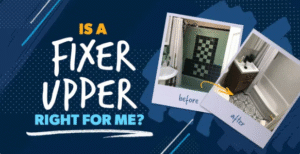Buying a home is one of the most significant financial decisions you’ll ever make. For many first-time buyers and seasoned homeowners alike, the idea of purchasing a fixer-upper can be both exciting and daunting. A fixer-upper is a property that requires renovations or repairs but often comes with a lower purchase price. In this blog, we’ll explore the pros and cons of buying a fixer-upper to help you make an informed decision.
Pros of Buying a Fixer-Upper
1. Affordability
Lower Purchase Price: Fixer-uppers typically sell for much less than move-in-ready homes, allowing you to enter the housing market more affordably.
Potential for Immediate Equity: By renovating, you can increase the property’s value significantly, putting you in a stronger financial position right from the start.
2. Personalization
Customize Your Space: One of the most appealing aspects of a fixer-upper is the opportunity to make it your own. You can choose layouts, materials, and finishes that fit your lifestyle and aesthetic preferences.
Creativity and Vision: If you have a vision for your dream home, a fixer-upper can give you the blank canvas to turn that vision into reality.
3. Investment Opportunity
Long-Term Value: Investing in a home that needs work can yield substantial returns if done correctly, especially in an area of good demand.
Tax Benefits: Renovations can offer tax deductions or credits, which can further improve your return on investment.
4. Less Competition
Fewer Buyers: Many buyers shy away from homes that need significant work, meaning you may face less competition and obtain a better deal on the property.
Cons of Buying a Fixer-Upper
1. Time and Effort
Potential for Lengthy Projects: Renovations can take time—sometimes much longer than expected—potentially delaying your plans to move in.
Ongoing Maintenance: Older homes typically require ongoing maintenance, adding to your responsibilities as a homeowner.
2. Hidden Costs
Unexpected Expenses: Repairs may uncover more serious issues (like plumbing, electrical, or structural problems) that weren’t initially apparent, leading to unexpected costs.
Budget Overruns: It’s common for renovation budgets to exceed initial estimates, leading to financial strain.
3. Stress and Disruption
Living in a Construction Zone: Depending on the scope of the renovations, living in a fixer-upper during repairs can be disruptive and stressful for you and your family.
Decision Fatigue: With so many choices to make regarding design and materials, decision fatigue can set in, leading to frustration.
4. Financing Challenges
Access to Funds: Traditional mortgage lenders often have stricter requirements for fixer-uppers, making it more difficult to secure financing. It may be advisable to have
some savings available to cover contingencies.
Conclusion
Buying a fixer-upper can be a rewarding yet challenging endeavor. While the lower purchase price, potential for personalization, and investment opportunities are attractive, the time, effort, and hidden costs cannot be overlooked. Before proceeding, weigh these pros and cons against your financial situation, goals, and willingness to take on a renovation project. If you’re prepared for the journey, a fixer-upper could be turned into your dream home!

#FixerUpper #HomeRenovation #HomeTransformation#RealEstatetips #GrenadaRealestate #McBREALTY

